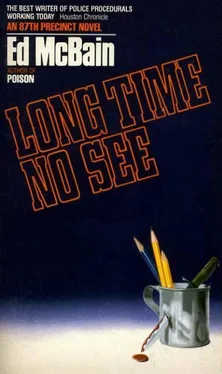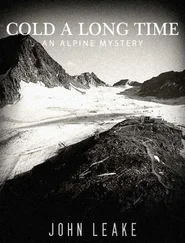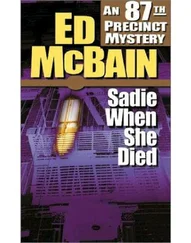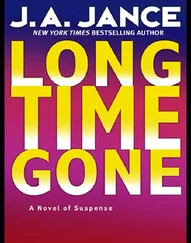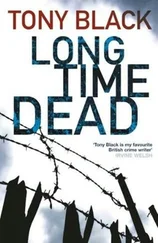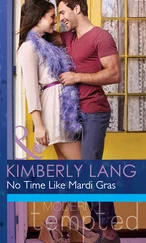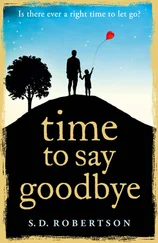Carella then called Fort Lee, Virginia, and learned that John Francis Tataglia, the erstwhile platoon sergeant who’d presumably been promoted to second lieutenant, was now Major Tataglia and had been transferred to Fort Kirby this past September. Fort Kirby was in the adjoining state, some eighty miles over the Hamilton Bridge. Carella called the major there at once, and told him he’d be out to see him that afternoon. The major did not remember Pfc. James Harris until Carella explained that he was the man who’d been blinded in action. Cotton Hawes was just coming through the slatted rail divider as Carella hung up the phone. He signaled to him, and Hawes walked over to his desk; his red hair had been tangled by the wind outside, his face was raw, he looked fierce and mean.
“Are you busy?” Carella asked.
“Why?”
“I need someone to call Sarasota for me, do a telephone interview. I’ve got to go out to Fort Kirby right away.”
“Sarasota? Where’s that, upstate?”
“No, Florida.”
“Florida, huh? Why don’t I just fly on down there?” Hawes said, and grinned.
“Because I also want you to go see a man in Majesta. What do you say?”
“What am I supposed to do with the three burglaries I’m working?”
“This is a homicide, Cotton.”
“ I've got a homicide, too,” Hawes said. “Somewhere on my desk, I’m sure I’ve got a homicide.”
“Can you help me?”
“Fill me in,” Hawes said, and sighed.
In order to get to Fort Kirby in the bordering state, one drove over the Hamilton Bridge and through a community called Baylorville, which in the good old days used to be the pig-farming center of the state. Nowadays there was nary an oink to be heard in the vicinity, but the place stank nonetheless, and Meyer put his handkerchief to his nose the moment they began driving through it. He was beginning to discover that he had a very sensitive olfactory mechanism, a quality he had not recognized in himself earlier. He wondered how he could put this to good use in the crime detection business. Meanwhile, he looked out dismally at the rows of factories and refineries, incinerators and mills that lined the Parkway. The weather had turned bleak and forbidding. Even without the benefit of the smokestacks belching their filth and stench into the air, the sky would have been the color of gunmetal.
Both men sat huddled inside their overcoats. It was 12:30 by the car clock, and Fort Kirby was still forty miles away. The Parkway tollbooths were spaced exactly five miles apart; Carella kept rolling down the window on the driver’s side and handing quarters to toll collectors. Meyer kept track of the quarters they spent. They would later turn in a chit to Clerical, hoping they’d one day be reimbursed. In the Police Department, chits were questioned closely, the operative theory being that people in law enforcement were all too often crooks themselves, educated as they were in the ways of thieves. After all, who was to say that the fifty cents spent for a bridge toll had not instead been spent for a hamburger, medium rare? Carella asked for receipts at all of the tollbooths. He handed these to Meyer, who clipped them to the inside cover of his notebook.
It was twenty minutes past one when they reached Fort Kirby. Carella identified himself to the sentry at the gate in the cyclone fence surrounding the base. A huge sign, black lettered on white, advised that no one but authorized personnel would be admitted to the area. The sentry examined Carella’s shield and I.D. card, checked a sheaf of slips attached to a clipboard, and then said, “The major’s expecting you, sir. You can park just this side of the canteen, that’s the redbrick building there on your right. The major’s in A-4.”
“Thank you,” Carella said.
Major John Francis Tataglia was a man in his early thirties, with close-cropped blond hair and a blond mustache that hung under his nose like an afterthought. He was slight of build, perhaps five feet nine inches tall, with alert blue eyes and an air of total efficiency about him. You could visualize this man on a parade ground standing at attention in the hot sun, never wilting, never even perspiring. He rose from behind his desk the moment the sergeant ushered Carella and Meyer into his office. He extended his hand.
“Major Tataglia,” he said. “Pleased to meet you.”
Both detectives shook hands with him, and then took seats opposite his desk. The sergeant backed out of the room like an indentured servant. The door whispered shut behind him. From somewhere out on the drill field, they could hear a sergeant bellowing marching orders, “Hut, tuh, trih, fuh,” the repetitive chant oddly and overwhelmingly evocative. For Carella, it recalled his own basic training so many years before. For Meyer, inexplicably, it brought back with an almost painful rush the days when he played football for his high school team. Beyond the major’s wide window, November sprawled leadenly. It was a good month for memories, November.
“As I told you on the phone,” Carella said, “we’re investigating a series of homicides—”
“More than one?” Tataglia said. “When you told me you were looking for information about Harris, I assumed—”
“There’ve been three murders so far,” Carella said. “We’re not sure they’re all related. The first two most certainly are.”
“I see. Who were the other victims?”
“Harris’ wife, Isabel, and a woman named Hester Mathieson.”
“How can I help you?” Tataglia asked.
The top of his desk was clear of papers and even pencils. A brass plaque read Maj. J. F. Tataglia. A folding triptych picture frame showed photographs of a dark-haired woman and two little girls, one with dark hair, the other with hair as blond as the major’s. He touched the tips of his fingers together and held them just under his chin, as though in prayer.
Meyer kept watching him. With his extrasensory olfactory awareness, he detected the scent of cologne emanating from behind the major’s desk. He had never liked men who wore cologne, even if they were athletes being paid to advertise it on television. He did not like Tataglia altogether. There was something prissy about the man, something too starchily precise. He kept watching him. Tataglia had apparently decided Carella was the spokesman here; Meyer watched Tataglia and Tataglia watched Carella.
“We have reason to believe Harris may have contacted an old Army buddy regarding a scheme of his,” Carella said.
“What sort of scheme?”
“An illegal one, possibly.”
“You say possibly...”
“Because we don’t really know,” Carella said. “You were in command of the 3rd Platoon, is that correct?”
“Yes.”
“Were you present when Harris was blinded?”
“Yes. I later filed the action report.”
“And signed it as commanding officer.”
“Yes.”
“That was on December fifteenth. He was blinded on December fourteenth — is that correct? — and you filed the report on December fifteenth.”
“Yes, those are the dates,” Tataglia said.
“Had you been recently promoted?”
“Yes.”
“Before the action in which Harris...”
“Yes, a week or ten days earlier. We’d begun Operation Ala Moana at the beginning of December. Lieutenant Blake was killed shortly after the choppers dropped us in. I was promoted in the field. For the rest of the operation, I was acting O.I.C.”
“You were promoted to lieutenant?”
“Yes, second lieutenant in charge of the entire platoon. This was no simple vill sweep, you understand. This was a vast encircling maneuver involving a full battalion — mechanized units, artillery, air support, the works. The day before Harris got blinded, our recon patrol found an enemy base camp a mile to the southwest. We were marching toward it through the jungle when we got hit.”
Читать дальше
